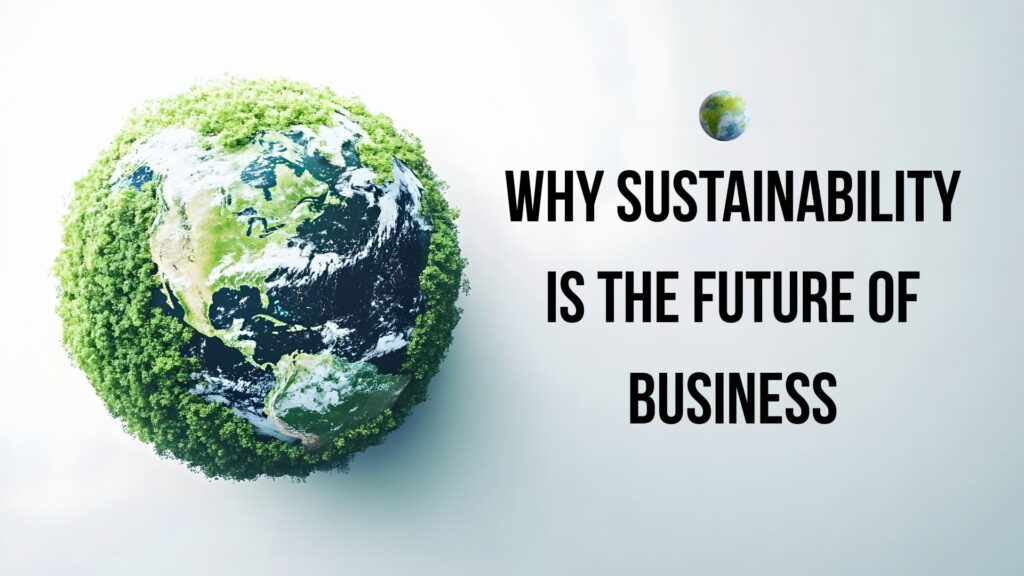
Sustainability is no longer a marketing trend—it’s becoming the foundation of how modern businesses operate, build trust, and grow. Consumers, investors, and governments now expect companies to be environmentally responsible and transparent. This shift has made sustainability essential for long-term competitiveness, not just a “good-to-have” initiative.
In this blog, we’ll explore why sustainability is shaping the future of business and how companies can benefit by adapting early.
What Sustainability Means for Businesses Today
Sustainability is the practice of operating in a way that is:
- Environmentally responsible
- Economically viable
- Socially ethical
For businesses, this means reducing waste, using eco-friendly materials, lowering carbon footprints, and ensuring responsible supply chains. It’s about building a company that delivers value without harming the planet.
1. Customers Prefer Eco-Friendly Brands
Consumers worldwide—especially younger generations—want products and brands that contribute to a healthier planet. They avoid companies that overuse plastic or use harmful materials.
Brands that adopt sustainability early gain:
- More customer trust
- Stronger brand loyalty
- Higher conversion rates
- Better word-of-mouth and online reviews
Whether it’s shopping bags, packaging, or retail products, eco-friendly alternatives like jute bags and cotton bags are becoming the preferred choice.
2. Sustainability Improves Brand Reputation
A sustainable business is seen as responsible, caring, and future-focused. Companies that support environmental causes or use renewable resources build emotional connections with customers.
Strong ESG values also help brands create:
- High recall value
- Long-term loyalty
- Positive press coverage
- Better relationships with distributors and partners
Simply put, sustainability makes brands more trustworthy.
3. Sustainable Operations Reduce Costs
Eco-friendly strategies often reduce long-term business costs. Examples include:
- Energy-efficient warehouses and machinery
- Reusable and recyclable packaging
- Optimized logistics that reduce fuel usage
- Lower material waste in production
A sustainable system is usually more efficient, helping businesses save money while improving performance.
4. Government Regulations Are Getting Stricter
Many countries are banning single-use plastic and promoting eco-friendly materials. New laws around carbon emissions, sustainable packaging, and waste disposal are coming into force globally.
Businesses that invest in sustainability now will:
- Avoid penalties
- Easily comply with future regulations
- Export smoothly to markets with strict standards (EU, UK, Australia)
This makes sustainability a smart business decision, not just an ethical one.
5. Investors Prefer Sustainable Businesses
Investment firms and venture capitalists now look for companies with strong ESG performance. Sustainable businesses are:
- Low-risk
- More stable
- Better for long-term growth
- More likely to attract global partnerships
A sustainable approach increases a company’s valuation and investor confidence.
6. Sustainability Encourages Innovation
Companies that aim to reduce environmental impact often innovate faster. They explore:
- New materials
- Cleaner production systems
- Reusable packaging designs
- Smarter supply chain solutions
This innovation helps businesses stand out in competitive industries.
7. Sustainability Strengthens Global Competitiveness
In international markets, sustainability is a major buying factor. Retailers, wholesalers, and corporate buyers prefer suppliers with:
- Ethical sourcing
- Eco-friendly materials
- Transparent production processes
Products made from jute and cotton—like shopping bags, totes, and packaging bags—are becoming the global standard as businesses switch away from plastic.
8. Why Jute and Cotton Are the Future of Eco-Friendly Products
Jute and cotton are two of the most sustainable natural fibers in the world. They are:
- 100% biodegradable
- Strong and durable
- Ideal for printing and customization
- Cost-efficient for bulk manufacturing
- Widely accepted in CSR, gifting, retail, and events
This makes them perfect for brands looking to reduce plastic waste while offering high-quality products.
Read More – https://www.jutify.com/plastic-vs-cotton-bags-which-is-more-sustainable/
Why Sustainability Is the Future: Final Takeaway
Sustainability drives:
- Better customer loyalty
- Higher operational efficiency
- Stronger global credibility
- Compliance with future regulations
- Improved investor trust
- Continuous innovation
Businesses that embrace sustainability today will dominate their industry tomorrow. It’s not just an environmental choice—it’s a long-term business strategy.
Why Choose Jutify?
Jutify is dedicated to helping brands switch to reliable, stylish, and sustainable alternatives to plastic. We manufacture both premium jute bags and high-quality cotton bags, designed for businesses that want eco-friendly solutions without compromising strength or design.
With Jutify, you get:
- Sustainable jute & cotton materials
- Custom printing and branding
- High durability and export-ready quality
- Ethical manufacturing practices
- Bulk production for retail, events & corporate use
- Strong appeal for markets in Europe, Australia & beyond
Whether you’re a retailer, wholesaler, or corporate brand, Jutify helps you move toward a greener future with products your customers will love.
Make your brand sustainable—partner with Jutify and switch to eco-friendly jute and cotton bags today.
